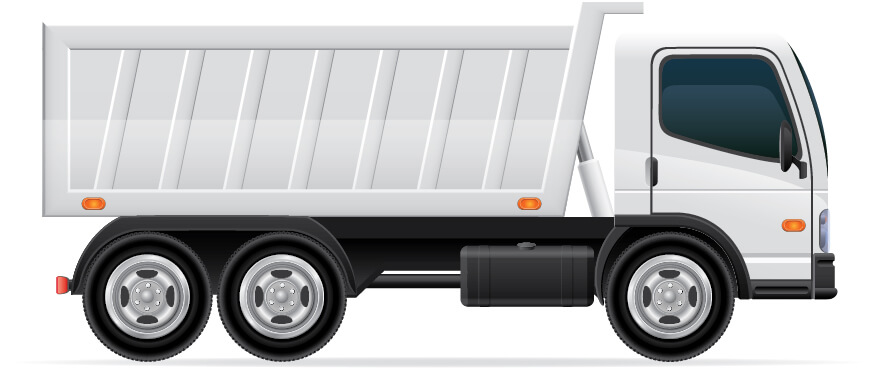Trucks and trailers are important tools in transporting goods throughout the country. However, when these vehicles are not properly used, negligence can lead to dangerous accidents. Each type of commercial truck or trailer has various capabilities when it comes to the amount of cargo and weight it can safely move. When these limits are ignored or forgotten, it can constitute negligence that can be answered with a personal injury claim or lawsuit. That’s why it’s essential to know commercial truck weight limits before you do any hauling.
Let’s take a look at a variety of different types of trucks and trailers and how much weight they’re approved to carry.
Menu of specific commercial truck weight limit:
- Box Truck Weight Limits
- Heavy-Duty Pickup Truck Weight Limits
- Single Axle Trailer and Double Axle Trailer Weight Limits
- Weighing Shipping Containers & Container Weight Limits
- Length Limit of Semis Pulling Multiple Trailers
- Dump Truck Weight Limits
Box Truck Weight Limits

Box trucks are commonly used both by companies and individuals for tasks like moving furniture or equipment. These include rentals, such as U-Haul trucks.
- Box trucks vary in size and length, anywhere from 16 feet to 26 feet long.
- These are available for anyone with a valid driver’s license to operate.
- The maximum gross weight for box trucks is 26,000 pounds. The reason for this limit is that anything over 26,000 pounds requires a commercial driver’s license (CDL) to operate.
Speak with a personal injury lawyer today. Call: 317-488-5500
Heavy-Duty Pickup Truck Weight Limits

These trucks are commonly used to haul large loads, either for work or personal trips, and can vary greatly in size and design. However, their overall carrying weight for the bed of the truck depends on the vehicle’s starting weight.
- A half-ton pickup can hold 3,000 pounds of cargo.
- A three-quarter-ton pickup can carry 4,000 pounds of cargo.
- A one-ton pickup can carry 6,000 pounds of cargo.
- Pickups can also haul hitched trailers. The maximum weight limits of these are called Gross Vehicle Weight Rating (GVWR) and are based on the make and model of the pickup truck. It is required that operators check their owners’ manual to calculate these totals.
Complete a Free Case Evaluation form now
Single Axle Trailer and Double Axle Trailer Weight Limits

Trailers can be hooked up to a pickup truck or other vehicle with towing capabilities. Single axle trailers have a single axle with a wheel connected to each end. Double axle trailers have two axles to disperse greater weight, meaning double trailers are capable of handling heavier loads.
Federal and Indiana state maximum truck weight laws require that:
- Single axles are limited to 20,000 pounds
- Double axles are limited to 34,000 pounds.
- The steering axle is limited to 12,000 pounds.
Incorrect wheels or overweight can cause issues with tire blowout accidents, for example.
Click to contact us today
Weighing Shipping Containers & Container Weight Limits

Containers are loaded onto semis for transport all over the United States. The containers are weighed at the port of arrival or in the facility they were packed in, using one of two legally approved methods as laid forth by the Safety of Life at Sea (SOLAS) Treaty:
- Weighing the packed container using calibrated and certified equipment.
- Weighing all packages and cargo items, including packing materials and the tare weight of the container, then adding the sum of all weights together to provide a verified weight. Estimating weights is not permitted under the SOLAS revisions.
Keeping track of these weights and measurements is a big undertaking. Containers must be loaded onto a truck using one of three approved container loading methods:
- By tilting the truck bed (similar to how a dump truck drops off trash).
- Placing directly onto a flat truck bed with a crane or forklift.
- With the use of a chassis, which attaches to the truck bed for easier loading and unloading.
Incorrectly weighed or loaded containers are a form of unsecured load negligence. Overly heavy containers loaded onto trucks can cause trucking accidents and damage to the transport vehicle itself. Data shows that as many as 20% of containers are improperly weighed or mis-declared.
- For a 20-foot container, 44,000 pounds can be loaded inside.
- In a 40-foot container, 44,500 pounds can be loaded inside.
- Regardless, they can’t cause the truck to exceed the maximum gross vehicle weight of 80,000 pounds.
Length Limit of Semis Pulling Multiple Trailers

Semi-trucks often pull multiple trailers behind them. While the maximum gross weight of the combined trailers is still 80,000 pounds, there are length restrictions involved as well. It should be noted that there is no length restriction on a truck-tractor-semi trailer or truck-tractor semi-trailer-trailer combination as a whole, but rather the individual parts.
- The maximum length of a semi-trailer, including the load, is 53 feet.
- The maximum length of a trailer used in a truck-tractor-semitrailer-semitrailer combination is 28.5 feet or 28 ft. 6 in.
Dump Truck Weight Limits

Dump trucks are used both by a city for trash collection, as well as privately by businesses and citizens for hauling debris. These vehicles can vary in style and size, depending on the manufacturer.
- The largest dump trucks can carry 28,000 pounds, roughly equivalent to 14 tons.
- The smaller styles of these vehicles carry a maximum of 15,000 pounds or 7.5 tons.
Semi-Truck Weight Regulations
Semi-trucks play a critical role in transporting goods across Indiana and the United States, but they must comply with strict weight regulations to ensure safety and prevent road damage. The federal law sets the maximum gross vehicle weight (GVW) for semi-trucks at 80,000 pounds. Speed limits for semi-trucks vary but are typically 55-65 mph on highways, depending on state laws. This includes the combined weight of the truck, trailer, and cargo.
Key Weight Limits and Factors for Semi-Trucks:
- Cargo Capacity: Depending on the trailer type and axle configuration, semi-trucks can carry between 42,000 and 48,000 pounds of cargo.
- Axle-Specific Limits: Federal and Indiana regulations specify weight limits for axles to distribute weight safely:
- Single axles: 20,000 pounds
- Double axles: 34,000 pounds
- Steering axle: 12,000 pounds
- Trailer Length: There is no federal restriction on the total length of a semi-truck and trailer combination, but individual trailers are generally limited to 53 feet in length.
Compliance and Enforcement
State and federal agencies enforce these regulations at weigh stations and through roadside inspections. Operators must ensure their trucks:
- Stay within weight limits specified on the Gross Vehicle Weight Rating (GVWR), found in the owner’s manual or on the door placard.
- Use certified scales to verify cargo weight.
- Properly distribute weight to avoid overloading any single axle, which can result in fines or mechanical failures.
Risks of Overweight Semi-Trucks
Exceeding these limits is considered negligence and can lead to:
- Increased risks of rollovers, brake failures, or tire blowouts.
- Severe damage to highways and bridges, resulting in costly penalties.
- Longer stopping distances, endangering other road users.
When truck operators or companies ignore these regulations, they can be held liable for accidents caused by overweight trucks. Victims of such incidents should seek legal assistance to hold negligent parties accountable.
Truck Driver Tips: How to Avoid Overloading
To ensure safety and compliance, follow these key tips:
- Use a Certified Scale: Weigh your truck before each haul to ensure you’re within limits.
- Know Your GVWR: Check the truck’s Gross Vehicle Weight Rating to understand your maximum weight capacity.
- Distribute Weight Evenly: Balance the load across the axles to avoid uneven weight distribution.
- Be Aware of Axle Limits:
- Steering Axle: 12,000 lbs
- Single Axle: 20,000 lbs
- Tandem Axle: 34,000 lbs
- Don’t Guess—Weigh: Never estimate weight; always verify before driving.
- Overweight Truck Accident Claims & Lawsuits
Overweight Truck Accident Claims & Lawsuits
When owners and operators of trucks ignore these maximum truck weight limits, it often causes hazards for them and others on the road. An exceeded weight limit can cause the truck to tip over, swerve uncontrollably, or require a much longer braking distance to come to a complete stop. When these trucks are carrying more than they’re allowed, negligence has occurred, and legal action should be taken.
If you’ve been the victim of a truck accident, you should call an experienced attorney who will fight for your rights. Contact the Indianapolis truck accident attorneys at Christie Farrell Lee & Bell to put strong legal champions on your side.
Dial 317-488-5500 or reach out to us online to set up a free consultation.
FAQ: Different Commercial Truck Weight Limits
Why do weight limits differ among trucks?
They ensure road safety, protect infrastructure, and accommodate different vehicle capacities.
How do I find my truck’s weight limit?
Check the truck’s GVWR in the owner’s manual or on the driver’s side door placard.
What if I exceed the weight limit?
Overloading leads to fines, increased accident liability, and potential road damage.
Do weight limits vary by state?
Yes, always check state-specific regulations in addition to federal laws.
Who enforces these limits?
State and federal departments via weigh stations and inspections.
What if I’m unsure about my truck’s weight?
Use a certified scale to weigh your truck, and adjust cargo as needed.
How does exceeding weight limits affect accident lawsuits?
Overweight trucks can be seen as negligence, impacting liability and compensation.
Call 317-488-5500 or complete a Free Case Evaluation form



